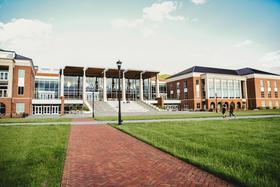Community colleges are not a new addition to the world of higher education, but they have certainly received more attention in recent years. As the current administration strives to increase college graduation rates across the country, community colleges are primed to play an important role in meeting that goal. For adults looking for an effective way to make a career change, or high school seniors weighing all of their options in the next phase of their academic career, understanding the full picture of community college can be an important component in the planning process. What are community colleges and what is their primary purpose? Read on to learn the basics of these essential institutions of higher education.
What is a Community College?
According to the Department of Homeland Security, community college is a “two-year school that provides affordable postsecondary education as a pathway to a four-year degree.” These schools also offer industry-specific training that helps graduates land jobs in the community directly after graduation. As the economy in the U.S. has changed in recent years, the quest for affordable, practical education has been on the rise. Community colleges tend to fit that bill to a “T” from trade-specific training to higher education that can stand alone or take the student directly into a four-year program.
Degrees offered by community colleges are typically associate degrees, which take two full years of coursework to complete. However, many certification and licensing programs may also be available through community colleges, depending on the employment needs of the immediate area. Some community colleges also offer four-year baccalaureate degree programs today. In addition, community colleges may offer transfer programs with four-year schools in the area, which allows students to transfer credits earned at the community college level directly to a four-year institution in order to complete a baccalaureate degree.
The American Association of Community Colleges states there are currently 1,132 community colleges across the country, serving more than 13 million students. More than half of that population is taking credit courses on a part-time basis. The rest may be enjoying non-credit classes right in their own neighborhood. Another percentage is working through their certificate or associate degree on a full-time basis. The average age for community college students is 28, with just over half the student population consisting of women. Nearly half are the first in their families to attend college.
This video from Seattle Community College explains what a community college is.
Community College vs. Four-Year School
While community colleges and four-year colleges and universities have solidified more practical partnerships in recent years, there are distinct differences between the two that should be carefully analyzed before a choice in higher education is made. Community colleges typically offer smaller class sizes and flexible scheduling that caters to students of all ages and backgrounds. For students that fear they might feel lost in a large university environment, community college may provide a more comfortable transition.
By the same token, community colleges tend to offer a more limited degree spectrum than four-year schools. While a large university may boast a wide number of separate schools under a single university umbrella, the community college is a one-size-fits-all approach to higher education. If the community college of choice offers the degree program a student is looking for, this may not be a problem. However, if a student wants to specialize in a different type of industry, or isn’t certain what he wants to major in heading into school, a larger university may offer significantly more opportunities.
This video discusses going to a community college vs. a 4-year college.
The History of Community Colleges
The first community colleges began cropping up at the beginning of the 20th century, as vocational extensions of local high schools. Many of the first community colleges were specifically designed to train students into specific professions. The schools tended to be much more open to accepting female students, particularly to train them to become elementary teachers. In fact, as many as 60 percent of students at some of the initial community colleges were women, all getting the necessary training to go into the teaching profession.
Early community colleges were relatively small, most hosting 150 students or less, according to the American Association of Community Colleges. Despite their small size, the schools offered a wide range of academics and extracurricular opportunities, including sports and performing arts. The schools were a combination of public and private schooling of the time. From the public aspect, community colleges offered academics in combination with activities beyond the classroom. Private school influence was also seen in the smaller class sizes and closer relationships between students and staff. All kept their focus on serving the immediate needs of the community – a mission still held by the majority of community colleges today.
The Mission of Community Colleges
The American Association of Community Colleges lists the general mission of these schools, which is consistent at colleges across the country. Features of the mission of community colleges include:
- The ability to serve all sectors of society through an open-admission policy
- Equal and fair treatment to all students, regardless of age, ethnicity or background
- Opportunities for lifelong learning for all members of the community
- Provision of higher education to community residents through quality instruction
- A comprehensive program of education, including academics and extracurricular options
Most community colleges today continue to strive to meet these mission features. While budget fluctuations, demographics and employment needs within the community may differ, schools ascribe to their purpose of serving their immediate community with high quality, higher education that prepares students for professional lives beyond their academic careers.
College Board recognizes that while community colleges differ from four-year institutions, they should not be regarded simply as extensions of high school. In fact, one study reported at College Board found that students who see community college as a high school extension are more likely to drop out after a semester or two. Instead, students need to view the community college experience as a separate type of learning that involves rigorous coursework and preparation for a future profession.
Benefits of Community Colleges
Community colleges offer a number of benefits for potential students, whether they are adults looking for a career change or recent high school graduates. Scholarships.com offers a list of some of the benefits of community college, which include:
- Different Entrance Requirements – Community colleges generally have an “open door” policy that allows any student to enroll, regardless of previous transcripts. This makes community college the perfect choice for high school graduates with less-than-stellar grades. Remedial coursework is available to help students bone up on subjects before immersing themselves in the rigors of a college curriculum.
- Lower Cost – Community colleges tend to cost much less than four-year institutions, saving students plenty of money as they pursue a degree program. Based on our calculations, you can save $80,000 by attending a community college first, rather than enrolling directly in a private college.
- High Quality Teaching – Community college professors may be fresh out of school, but they have been deeply immersed in the world of academia prior to their teaching positions. Most will have a minimum of a master’s degree in their field of study, but some will even hold a doctorate. Some professors from four-year institutions will even moonlight at community colleges to earn extra money or create a more flexible schedule for themselves while working on other projects.
- Smaller Class Sizes – Because community colleges are often smaller than four-year schools, their class sizes also tend to be smaller. This is good news for students who enjoy personal interaction with their instructors or may need a bit more help in the academic realm. Even online classes provide time and access for students to interact with their instructors and other students.
- Wide Range of Degree Programs – Although community colleges typically offer fewer degree programs than their four-year counterparts, the range of degree options at community colleges has grown significantly over the years. In addition to vocational training in fields like advanced manufacturing and alternative energy, students can find degree programs in the performing arts, health care and computer science. STEM subjects (science, technology, engineering, and mathematics) are also growing by leaps and bounds at many community colleges today.
Flexible Scheduling – Because community colleges cater to a more diverse student body than four-year institutions, scheduling tends to be more flexible at these schools. For example, many community colleges offer evening and weekend classes for working adults who are going to school on the side. Online classes that allow students to tailor instruction and studies around their schedules are also becoming more common at community colleges today.
- Partnership with Businesses – A relatively new trend with many community colleges is the ability to partner with local businesses. Community colleges offer training programs for those businesses, ensuring students who complete those programs have marketable skills at graduation. Some partnerships even include job placement after graduation.
This video looks at the benefits of attending community college.
Is Community College Right for You?
While community colleges typically offer a wide range of benefits for students, this choice may not be the best option for everyone. When weighing the choice between attending a community college and a four-year institution, ask yourself the following questions:
What do I want to study?
If community college is in your future, make sure to choose a school that offers the degree program you want. These schools have a much more diverse catalogue today, so you can find major areas of study in nearly any field.
What can I afford?
When finances are tight and you don’t want to graduate from college with a huge amount of student debt, community college can be a good option. Keep in mind that financial aid is available for community colleges as well. However, if you end up taking out loans to pay a portion of your education, the loan balances won’t be as large as they would with a four-year school.
How important is campus life?
One drawback at many community colleges is the lack of a campus community. Many students at community colleges are adults juggling jobs, family, and school, so they rarely spend time on campus after classes are over. If campus life is an important part of the college experience for you, look for a community college that offers campus housing or plenty of extracurricular activities. These features will give you a sense of the college community you are searching for.
Can I get a job with an associate degree?
According to the American Community Colleges website, the answer is a resounding “Yes!” Salary figures may not differ all that much between a two- and a four-year degree, either. In fact, the website cites statistics that show Ohio graduates from a four-year school earned an average salary of $32,207 a decade ago. Those who graduated with an associate degree that same year earned an average annual salary of $34,400.
Can I transfer to a four-year school?
If a four-year degree is still in the back of your mind, look for a community college that has a transfer agreement with a four-year school in your area. These transfer agreements ensure you can move all your credits earned in community college toward your four-year degree program. In some cases, counselors work with students directly to ensure the courses they take at the community college level will be the best contributors toward their eventual four-year degree program.
Can I find work after graduation?
If employment is your top priority in pursuing a college education, look for a school that partners with local businesses to provide training programs. For example, a local community college may offer a specific certificate program needed by a company nearby, ensuring students have the right qualifications for employment right after graduation. The school may even have a placement program with the employer that ensures positions to students after the training is complete.
Community colleges have a long and illustrious history in the United States, serving as essential institutions of higher education for millions of Americans. As the federal government works toward graduating more Americans from college in the future, these schools offer promise that their integral education role will not diminish. In fact, all signs tell us that the attraction and purpose of community colleges in the U.S. will only grow.
Questions? Contact us on Facebook. @communitycollegereview















